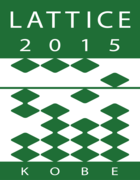Speaker
Prof.
Alexander Molochkov
(School of Biomedicine, Far Eastern Federal University)
Description
The most important probes for the phase states of a four-dimensional gauge field theory are the Wilson and t’Hooft line operators that are defined on one-dimensional curves in the space-time. However, for more detail understanding of four-dimensional gauge field theory dynamics and vacuum topology we need additional probes expressed by operators defined on the subspaces with higher dimensions. Possible candidates are operators that are defined on the two-dimensional surface in the four-dimensional space-time. The corresponding spatial surface operators are sensitive to the magnetic flux through a closed surface, what provides a tool for monopole condensate study. The area and volume dependence of the surface operator can provide a probe for the correlated and uncorrelated monopoles and antimonopoles condensation. In the present work the surface operator dependence on the surface area and volume are studied in the confinement and deconfinement phases within the SU(2) gauge field theory on the lattice. It is shown that spatial and temporal surface operators cannot be defined by the perturbation theory expansion only. The leading non-perturbative correction is obtained. Its dependence on inverse lattice coupling constants and temperature is studied. It is shown that the non-perturbative correction has dimension two and does not depend on temperature.
Primary author
Prof.
Alexander Molochkov
(School of Biomedicine, Far Eastern Federal University)
Co-author
Mr
Vladimir Goy
(Far Estern Federal University)

